
The Hub. Submit your story.
Public Health Liberation wants to hear your stories.
Scroll to bottom of page to submit
Public Health Liberation is dedicated to elevating public health to be aligned with everyday experiences with health. This includes creative expression, news aggregation, and storytelling. We believe that pathways for improved community health is deeply embedded in being receptive and responsive to diverse human expression, communication, and needs. Public Health Liberation deeply values the indispensable role and contribution of women as the gateway for achieving health equity.
We want to share your story on health and well-being. We accept all perspectives and creative forms. We just require that your work is original and publishable on our website. We can also link to sources that you find compelling and relevant. Email info@publichealthliberation.com

#ProtectBlackWomen
I recently met Dr. Stacy Scott at a Starbucks in Washington, DC. After admiring her handbag embossed with the words, “Protect Black Women” from afar for the better part of 15 minutes, I knew that I had to introduce myself. After wrapping up my conversations, I approached Dr. Scott to ask if I could take a picture of her and her bag. I was elated that she said “yes” without hesitation. I was so delighted that we both shared a commitment to health equity. Like me, she wears many hats - Executive Director of Baby 1st Network and works with the Global Infant Safe Sleep (GISS) Center and National Insitute for Children’s Health Quality. The mission of the Baby 1st Network is to provide educational materials and support to mothers and families to reduce the incidence of Sudden unexpected infant death (SUID), as well as services to families who have experienced the loss of an infant less than one year of age. Dr. Scott can be found on Facebook, Twitter, and Instagram.
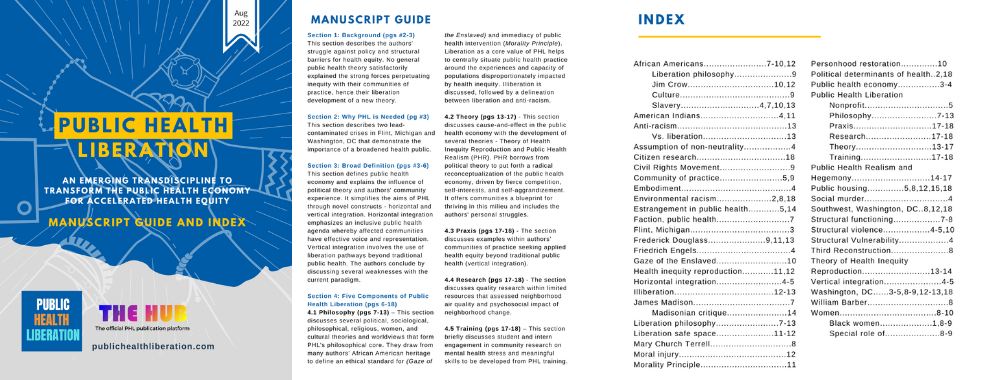
Manuscript Section Guide and Index
Public Health Liberation is a rich and complex approach to understanding and affecting drivers of health inequity. A section guide and index are intended to guide the readers and serve as a referential document for future reading. Given the denseness of our discussion and the 20-30 minutes that are required for a thorough read, we suspect that readers will repeatedly return to master the constructs and theories. This guide is available for download on our website.

Moral and Religious Reasoning in Political Engagement: Learning from Faith Leaders
Public Health Liberation seeks to centrally situate philosophy in public health discourse on accelerating equity. Philosophy is broadly defined as a worldview based on moral, cultural, and religious teachings and standards by which to make sound judgments and to engage in critical analysis. PHL encourages a clear articulation of relevant values as part of a general strategy to accelerate health equity and encourage order in the Public Health Economy. Ethical and religious beliefs benefit public health discourse.

American Hospitals: Healing a Broken System - New Documentary
American Hospitals: Healing a Broken System premiered on March 29, 2023 at the E Street Cinema in Washington, DC. This documentary provides a provocative look inside the world of profit-driven motives in US healthcare. Unfinished Business Foundation, founded by Richard Master, produced this fourth installment in its documentary series. The major conclusion is that the US healthcare system has fueled an unequal system in which socioeconomic factors, geography, and payer-mix take priority over healthcare access and quality. Rising healthcare costs in the US are unsustainable.

It is Budget Season: Encouraging Public Health Liberation Theory and Practice
To achieve health equity, Public Health Liberation (PHL) posits that shared values and beliefs (philosophy) should broaden our understanding of causal factors (theories) and maximize the variety of tools and solutions (praxis), to include data-gathering (research) and community and student development (training). PHL resembles a “pluripotent” discipline - theoretically-rich, technically adaptive, and socially immersed. Practitioners are conversant in wide-ranging theories and worldviews needed to explain and affect the context that reproduces health inequity.
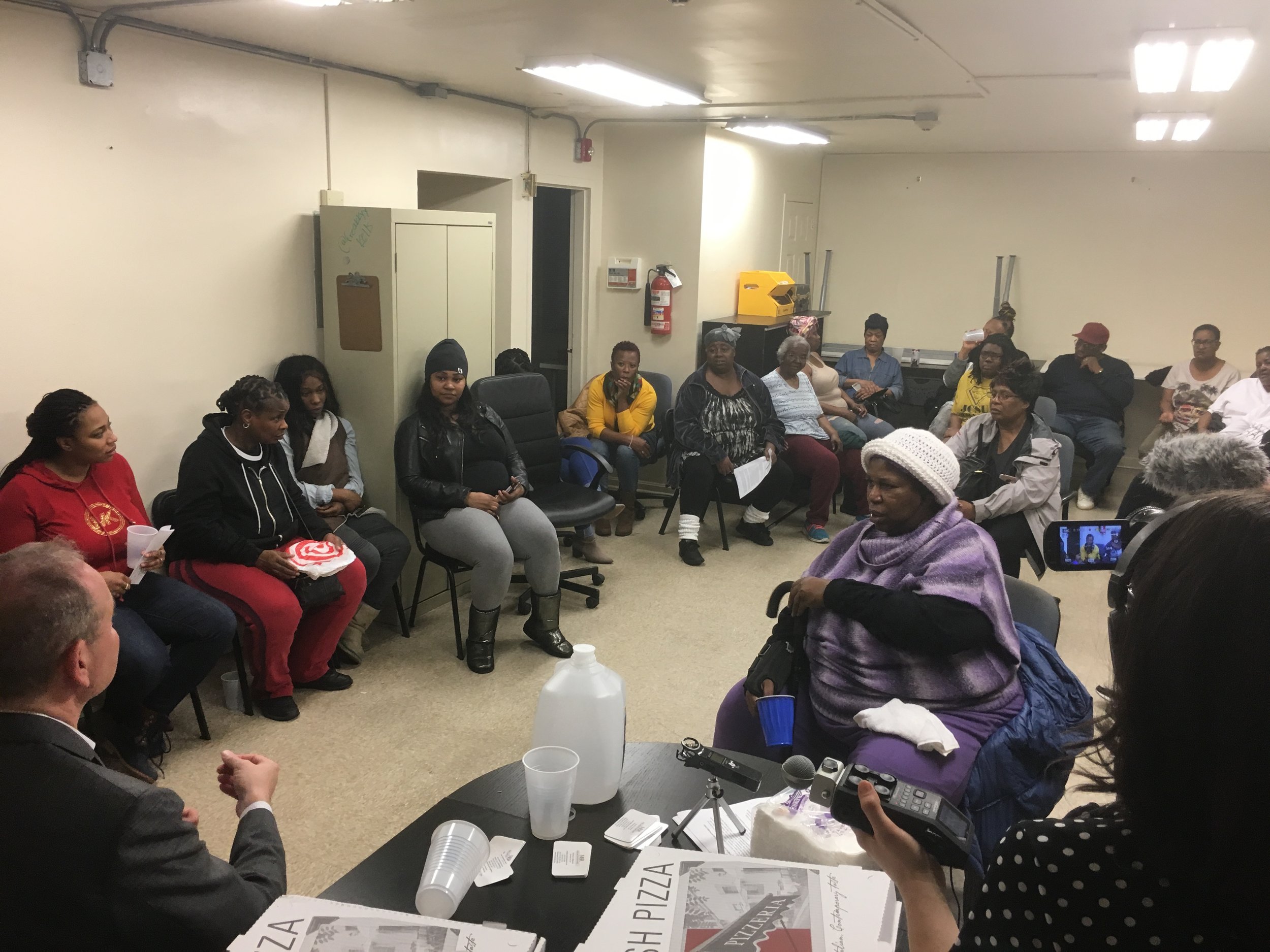
PHL Founder Publishes on Community-Led Research
PHL Founder Christopher Williams, a PhD candidate, recently published a framework on conducting community-based research in Advances in Clinical Medical Research and Healthcare Delivery. This approach benefits organizations seeking to identify community health needs and pathways for meaningful engagement.

Shared Historical Trauma – Weathering, Numbing and Reality
By Dr. Jim Deutsch
We all hear about the increasing burnout and “moral injury” in healthcare workers resulting from the current contradictions in healthcare and public health. About the feelings of helplessness in encountering individual trauma and suffering. At the same time, how do we healthcare providers make good use of our indignation at the obvious impacts of the systemic wrongs, blindness, and injustices? How can we turn cynicism and pessimism at the transparent prioritizing of profits and power over prevention and protection? Healthcare and the people we serve continue to be commodified as “value” to be extracted from bodies.
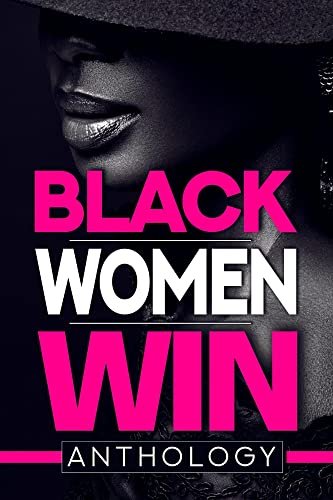
PHL Board Member Ebony Moody Centers Black Women’s Perspectives in New Anthology
Public Health Liberation Board Member Ebony Moody recently published an anthology of Black women’s life experiences. Black Women Win: Stories to Celebrate, Honor Salute, and Acknowledge Black Women presents ten amazing women who journeyed from tragedy to triumph. Representing many facets and walks of life, this anthology embodies tales of love, trauma, and victory. These stories uplift and showcase Black women’s successes and immense sacrifices that have been unseen, unheard, and swept under the rug for centuries. Sharing these stories breaks the chains of shame and guilt and opens paths of healing, gratitude and holistic health. This book was written to inspire women across the globe to pursue their heart-filled dreams and to defy the odds.

Public Health Liberation – An Emerging Transdiscipline to Elucidate and Transform the Public Health Economy
Public Health Liberation (PHL) is an innovative general theory of public health aimed at accelerating health equity. This paper provides a rich synthesis of philosophical traditions, novel theories, and approaches to establish the basis for a new public health transdiscipline. The authors argue that the "public health economy" as a single analytic lens elucidates the contradictions and tensions that reproduce vast health inequity. Authored by a majority of Black women, community experiences and perspectives are a major strength of this paper because they draw upon leadership experiences with contemporary issues.
The authors begin by describing their background in public health advocacy and by demonstrating the need for PHL using lead-contaminated water crises from Flint, Michigan and Washington, DC. They discuss the benefits of horizontal and vertical integration that broaden public health discourse to include affected populations and that seek opportunities throughout the public health economy. Their philosophical and theoretical reasoning reinterprets and adopts disciplinary concepts in political theory, sociology, women's studies, African American emancipatory writing, anti-racism, and community psychology to form a culturally relevant worldview and cogent thesis. Several new constructs emerge that do not appear elsewhere in the literature - Gaze of the Enslaved, Morality Principle, liberation, illiberation, liberation safe spaces, public health realism, and hegemony. The authors use their ethical and theoretical assumptions to guide practice and community self-help. Public Health Liberation presents a major challenge to assumptions about public health effectiveness in addressing vast health inequity.
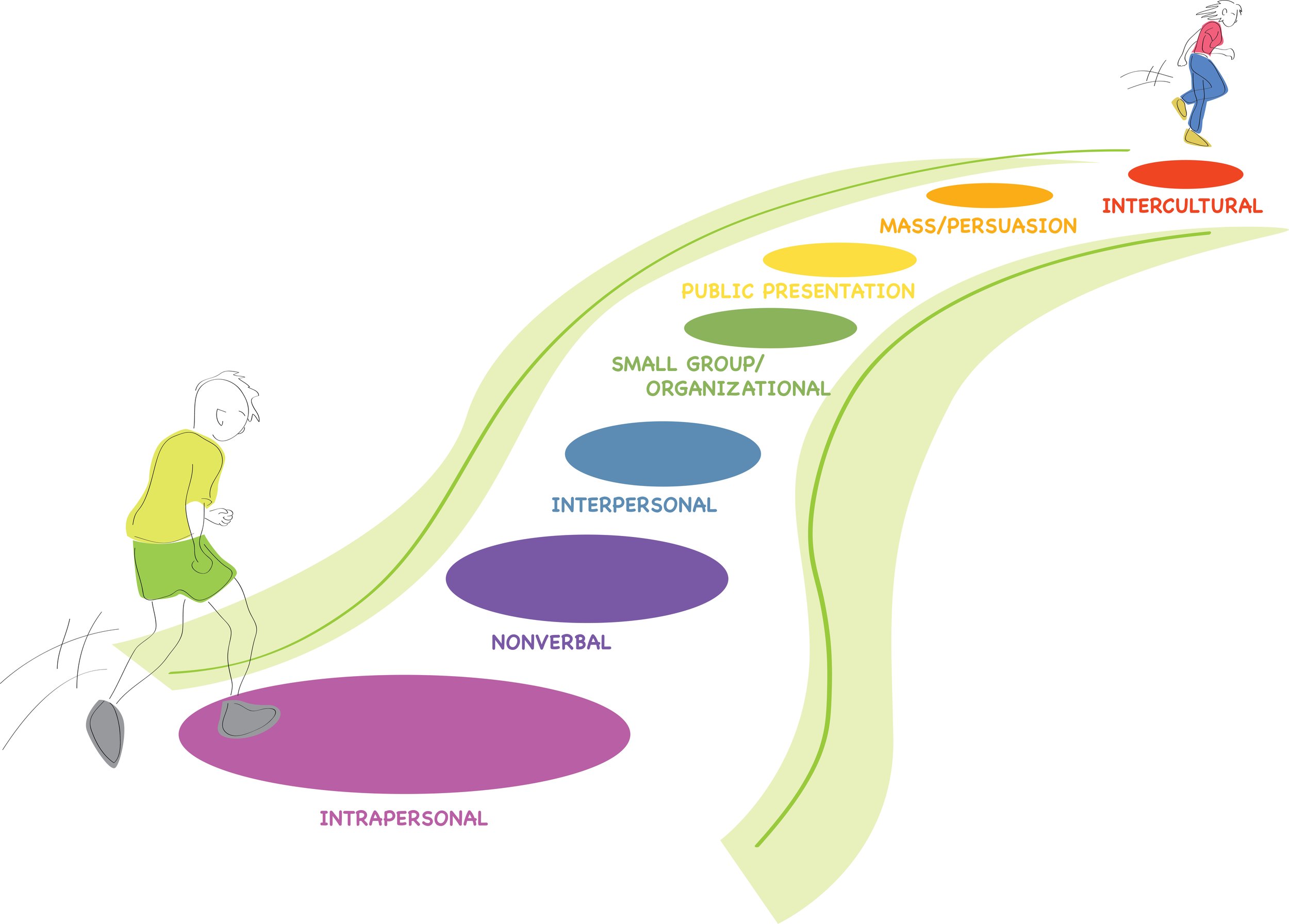
Public Health Crisis Public Enemy #1: Communication Dysfunction
There is a Public Health crisis affecting individuals, families, entire communities and our society-at-large. It is the precursor of most preventable illnesses and death. This systemic problem is blended into the fabric of EVERY socio-environmental context.
Human Communication Institute (HCI) and equally concerned healthcare advocates, recognize this specific crisis as the absence of effective communication and listening skills amongst interdependent individuals and groups affecting and exacerbating current public health inequities. HCI identifies Human Communication skills -distinguishable from the biological abilities of talking and hearing – as the #1 determinant of a healthy Public Health system and institution.

Rethinking Race and Black History Month- Lessons from US Capital
This cross-posting from Southwest Voice examines vast racial economic and health disparities in Washington, DC through accommodationist and cultural meanings of race among Black Americans and society. Washington, DC is the site of growing apartheid - a term not used loosely. DC has the highest spending per capita and the highest health spending per capita of any US city while racial differences in income and life expectancy continue to grow. Life expectancy for Blacks is worse than the US overall. The Black population is sizable, equaling the White population. City leadership is majority Black. These trends raise profound questions about the relevance of race and provide insight into barriers to racial equity. If racial inequity is flourishing in Washington, DC, then is the US facing greater headwinds to realize racial equity than public health discourse suggests? This discussion is highly consequential to public health theory and practice.
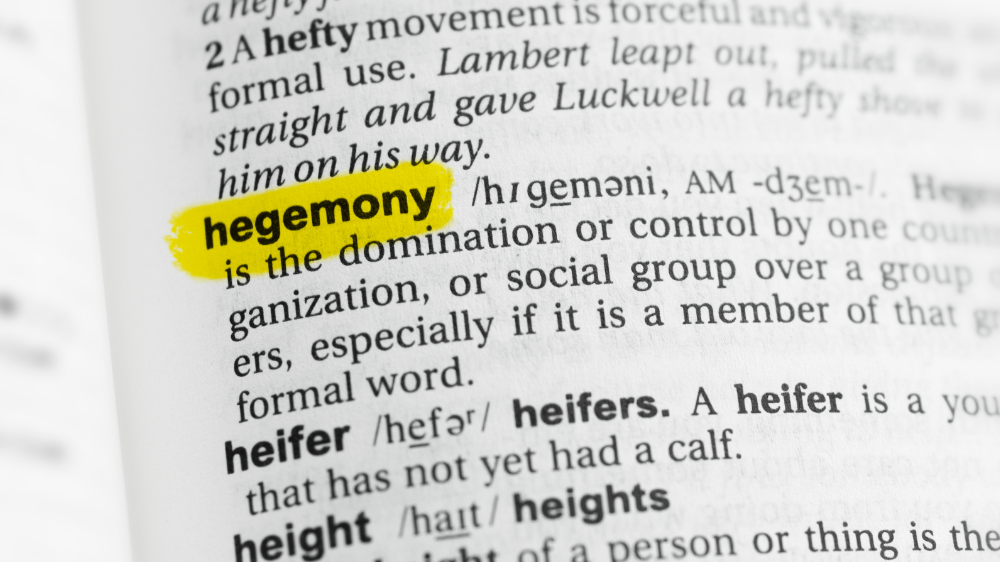
Hegemonic Arrangements in the Public Health Economy: Gaining Insight into Motivations and Behaviors
The theory of hegemony is a “grand theory” that helps to explain how and why societies are organized the way they are, including maldistribution of resources and mistreatment of certain populations. This essay builds on Antonio Gramsci’s concept of hegemony to examine the performance of the macro- and micro-Public Health Economy. It first provides a brief summary of hegemony, relying heavily on George Hoare and Nathan Sperber’s An introduction to Antonio Gramsci: His Life, Thought and Legacy. It extends this framework to contemporary issues using the author’s extensive community knowledge and experience. It answers questions on why certain populations with shared health burdens and interests might differ in approaches to self-advocacy.

Far from Abstract: Housing Determinants of Health Explained
Housing determinants of health are part of a broad set of factors perpetuating health inequity within the Public Health (PH) Economy. These determinants are typically defined as a type of social determinant of health explained by the lack of affordable housing, housing insecurity, shortened residential tenure, and poor housing conditions. [1] However, this definition fails to capture system failures wherein PH economic agents are responsible for exacerbating these housing determinants. This article will focus on the role of government agencies.
Image: Photo from HUD’s audit of the DC Housing Authority

Weaponizing Color: Public Housing Painted with Prison Blue
Residents in public housing and allies protest use of institutional color used in prison and public buildings.

PHL Research and Data-Gathering within Resource Limitations
In its inaugural manuscript, Public Health Liberation emphasized research through diverse approaches to include quality formal academic research and data-gathering. It sought to democratize how research is conducted by relying on academic and community partnerships to assess sources of harm to community health. Several approaches were discussed related to air quality monitoring, tracking community health outcomes, resident displacement, and worsening social determinants of health. Led by founders of Public Health Liberation, Project Southwest was an unfunded cross-sectional study on neighborhood change and health. The recently published manuscript discusses new measures for studying the effects of intense change in the built environments.

PHL - Flashcards
These flashcards break down some key concepts in Public Health Liberation Theory and Practice.

Applied Liberation: Community Solutions When Funding is Limited
Our communities of practice face an endless barrage of challenges to community health. We have compiled a list of liberation strategies that do require little to no costs. Public Health Liberation theorizes that increasing liberation expression and action are essential for accelerating health equity. A lack of public investment in communities’ liberation capacity is thought to be a causal factor in health inequity reproduction. In our conceptualization of community of practice, we need individuals who share a common identity and have geographical closeness while also shouldering a shared health burden.

Resident Council Leaders Deliver Testimony After HUD Issues Scathing Report of DC Housing Authority
Our manuscript discussed the deep income and racial chasms in the nation's capital. The Black-white life expectancy gap is an astonishing 12 and 17 years, respectively for females and males. The US Department of Housing and Urban Development recently issued the results of an audit into the DC Housing Authority (DCHA), concluding that the city's largest landlord had 82 findings of deficiencies. The 72-page report noted that the housing authority had the largest percentage of empty units of any housing authority in the nation, among procurement violations and poor commitment to housing quality for low-income residents. While the report does not examine the health implications of DCHA's poor upkeep, including mold, pests, and rodent infestations, the public health import is clear.

Perspective: African American Public Health Student Traumatized In Training Program
I am completing my graduate studies at a top research US university while trying to heal from racial trauma and other forms of psychological injury that I have experienced while training - senior faculty speaking to me of "lazy Black people," being separated by race for class activities, instructor disdain for critical race theory and other critical theories, assigned readings on Blacks and criminality, and denial that any racism exists at all in the learning environment. As a form of historical re-traumatization due to being a descendant of enslaved African Americans, I was not able to negotiate the value of my labor when a faculty member exploited other students' and my labor by using course assignments to fulfill activities that a federal grant specifically funded. We had not consented to use our labor in this way and had no insight into the unethical and illegal practice until the end of the semester when it was too late.

Preview: Next Manuscript for PHL
As with our inaugural manuscript, our subsequent white paper will undergo peer-review. We are preparing a follow-up discussion on PHL research, practice, and training. The following themes will be explored. The manuscript is expected in fall 2022 or winter 2023. In part, it will critically assess accepted approaches and practices in research on race and ethnicity that we believe to be methodologically and ethically problematic.
Systemic Racism in Society Has Major Implications for Research - Clear evidence of widespread racism in the public health economy suggests an "exposure" which most major research studies should account for, as it likely confounds study findings that cannot be controlled for simply by controlling for race in data analysis. Race is an ill-defined construct apt to measurement error. In fact, any belief in the common occurrence of racism translates as a nesting effect in statistical theory and makes many common inferential statistical tests inappropriate.
Creative Arts.
“Maybe, we the project”
University professor and poetess PS Perkins reminds us about the humanity and lived experiences of families who live in public housing communities. She read her poem, “When a House is Not a Home” at the PHL National Webinar and Conversation on Liberation Philosophy, Systems Thinking, and Social Determinants of Health.
Documentary on Gentrification Captures Community Voices
Prior to starting Public Health Liberation,, Christopher Williams began an unfinished documentary to capture community voices in this gentrifying neighborhood of Washington, DC.
Submit to The Hub.
Please use the form below to submit. If you would rather include an attachment, please email phlhubsubmit@gmail.com.
Terms and Conditions: Upon submitting, you agree that you are the copyright holder or otherwise are legally entitled to submit for publication in The Hub and that you are truthfully representing your true or legal identity with the contact information that you include with your submission. You agree that the content is not published elsewhere. Once you submit to The Hub, we retain the ability to publish on our website and other promotional materials. You may request to remove content at any time.


